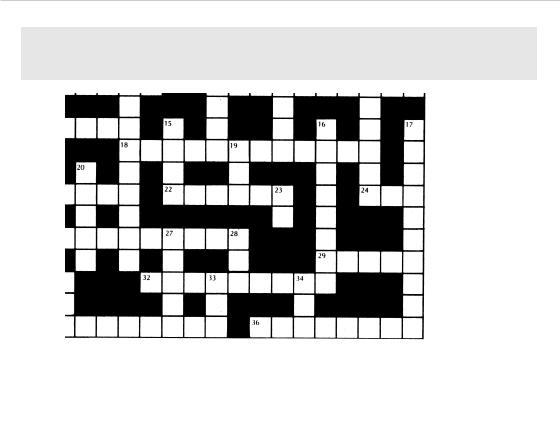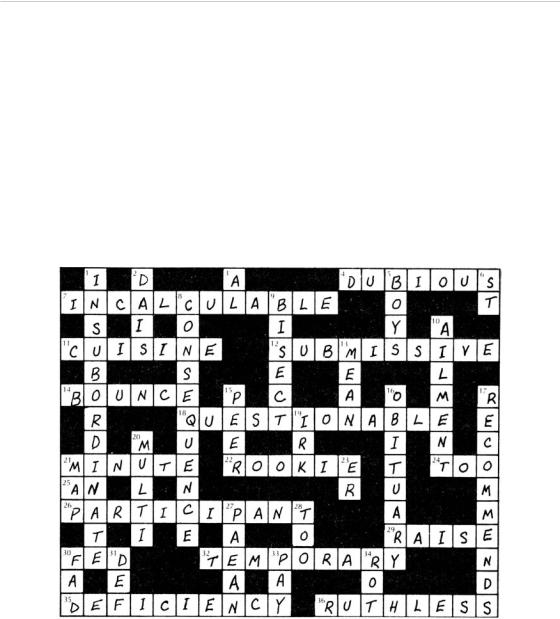
0083436_EB18E_master_toefl_vocabulary
.pdfChapter 5: All About Roots
11.Ostensibly, she enjoys her vacations in Nova Scotia, but she really would prefer someplace warmer.
(A)probably
(B)obviously
(C)seemingly
(D)definitely
12.Because children are inoculated against measles, there are currently very few cases of the disease in the United States.
(A)treated
(B)injected
(C)isolated
(D)subjected
13.Pat cannot take elevators because she has claustrophobia.
(A)unreasonable fear of heights
(B)unreasonable fear of closed spaces
(C)unreasonable fear of elevators
(D)unreasonable fear of people
14.The doctor told him to keep his arm immobile for a few days.
(A)in a sling
(B)encased in ice
(C)motionless
(D)exercised
15.The hurricane caused incalculable damage in New England.
(A)very great
(B)very little
(C)very calculating
(D)very abusive
111 exercises
www.petersons.com

112 |
PART III: TOEFL Vocabulary Review |
EXERCISES: PUTTING IT TOGETHER
Directions: This crossword puzzle is a review of some of the vocabulary in this chapter.
|
Across |
|
Down |
3. |
Indefinite article |
1. |
Disobedient |
4. |
Doubtful |
2. |
Stage, platform |
7. |
Very great |
3. |
Suffix meaning relating to |
11. |
Cooking |
5. |
Antonym of girls |
12. |
Passive, obedient |
6. |
Abbreviation for saint |
14. |
Go up and down |
8. |
Result |
18. |
Uncertain |
9. |
Divide into two parts |
21. |
Very small |
10. |
Sickness |
22. |
Beginner |
13. |
Signify |
24. |
Also |
15. |
Equal |
25. |
Indefinite article |
16. |
Death notice |
26. |
Someone who takes part |
17. |
Suggests |
29. |
Bring up (children) |
19. |
Bother |
30. |
Past of feed |
20. |
Prefix meaning many |
www.petersons.com
|
Chapter 5: All About Roots |
||
|
Across |
|
Down |
32. |
Antonym of permanent |
21. |
Traveler’s tool |
35. |
Shortage |
23. |
Suffix meaning one who |
36. |
Merciless |
27. |
Joyous song |
|
|
28. |
Also |
|
|
30. |
Temporary pursuit |
|
|
31. |
Abbreviation of definition |
|
|
33. |
Salary |
|
|
34. |
Decay |
113 exercises
www.petersons.com

114 |
PART III: TOEFL Vocabulary Review |
ANSWER KEY
Synonyms
1. |
A |
6. |
B |
11. |
C |
2. |
C |
7. |
A |
12. |
B |
3. |
D |
8. |
C |
13. |
B |
4. |
B |
9. |
A |
14. |
C |
5. |
D |
10. |
D |
15. |
A |
|
|
|
|
|
|
Putting It Together
www.petersons.com

Chapter 5: All About Roots |
115 |
SUMMING IT UP
•Most word roots have prefixes and suffixes attached to them.
•Most roots in English come from Greek or Latin
•You will see connections among words once you recognize the word roots.
www.petersons.com

All About Prefixes
OVERVIEW
•Prefixes
•Strategies for learning prefixes
•How prefixes work
•Learning words with Greek prefixes
•Learning words with Latin prefixes
•Prefixes for numbers
•Anglo-Saxon prefixes
•Summing it up
PREFIXES
A prefix is a form added in front of a word or word root to change its meaning. For example, the prefix il means “not,” so the word “illegal” means “not legal.” Learning prefixes will help you work out the meaning of many words you do not know in English and will help you with all parts of the TOEFL. There are more than fifty prefixes in English and you will learn most of them in this chapter.
STRATEGIES FOR LEARNING PREFIXES
•By doing the vocabulary builders and exercises in this chapter, you will familiarize yourself with the most common prefixes in English. This will enable you to recognize or guess the meanings of hundreds of words.
•A prefix usually changes the meaning of a word. For example, the prefix in- changes the meaning of a word to the opposite. “Capable” means “having the ability of doing or being.” “Incapable” means “not having the ability of doing or being.”
•Prefixes are often attached to roots of words.
Examples
re → act
inter → act
trans → act
By knowing the prefix and the root, you can work out the meaning of the word.
117
6 chapter
118 |
PART III: TOEFL Vocabulary Review |
NOTE
The word prefix is made up of the Latin prefix prae, which means “before,” and the root word fix, which means “firmly placed.” It takes a prefix to describe prefix!
HOW PREFIXES WORK
Prefixes Are Added to the Front of Roots to Create Many Words
As you have read, prefixes are placed at the beginning of a word to change its meaning. Therefore, knowing just a handful of prefixes can make it easy for you to figure out many words—without ever having to use a dictionary. Here are some examples with the prefix re, which means “to do again.”
Prefix + |
Root = |
Word |
Definition |
|
|
|
|
re |
absorb |
reabsorb |
absorb again |
|
|
|
|
re |
acquaint |
reacquaint |
meet again |
|
|
|
|
re |
qualify |
requalify |
qualify again |
|
|
|
|
re |
admit |
readmit |
admit again |
|
|
|
|
re |
allocate |
reallocate |
allocate again |
|
|
|
|
re |
appear |
reappear |
appear again |
|
|
|
|
re |
arrange |
rearrange |
change the arrangement |
|
|
|
|
re |
attach |
reattach |
attach again |
|
|
|
|
re |
fasten |
refasten |
fasten again |
|
|
|
|
re |
copy |
recopy |
copy again |
|
|
|
|
Prefixes Are Most Often Attached to Words Without a Break
Even though you may have seen the prefix written with a hyphen (as in pre-, re-, de-), the prefix is attached seamlessly. The following chart shows some examples:
Prefix + |
Root = |
Word |
Definition |
|
|
|
|
dis |
inter |
disinter |
to unearth (dis-in-tur) |
|
|
|
|
dis |
credit |
discredit |
to cause to be doubted |
|
|
|
|
extra |
terrestrial |
extraterrestrial |
alien (not of this place) |
|
|
|
|
in |
tractable |
intractable |
hard to handle; unmanageable |
|
|
|
|
mal |
content |
malcontent |
a dissatisfied person |
|
|
|
|
multi |
faceted |
multifaceted |
having many sides or aspects |
|
|
|
|
multi |
form |
multiform |
having many different forms |
|
|
|
|
phil |
harmonic |
philharmonic |
fond of music (fil-har-mon-ik) |
|
|
|
|
www.petersons.com
Chapter 6: All About Prefixes |
119 |
Prefixes Are Different Lengths
Prefixes can be as short as one letter or as long as six letters. The following chart shows some examples:
Number of Letters |
Prefix |
Sample Words |
Meaning |
|
|
|
|
One-Letter Prefix |
a |
amoral |
not moral (ay-mor-al) |
|
|
|
|
Two-Letter Prefix |
co |
cohabit |
live together |
|
|
|
|
Three-Letter Prefix |
pre |
premature |
before mature |
|
|
|
|
Four-Letter Prefix |
para |
paragraph |
subsection of a writing |
|
|
|
|
Five-Letter Prefix |
tract |
tractile |
ductile; able to be drawn out |
|
|
|
|
Six-Letter Prefix |
circum |
circumlocution |
a roundabout way of speaking |
|
|
|
(sir-cum-loh-que-shun) |
|
|
|
|
Prefixes Can Have More Than One Meaning
For example, the Latin prefix in- can mean “in” (as in inhabit), but it can also mean not (as in inhuman). As a result, knowing a prefix will take you only so far in defining testworthy words. You'll also have to use context clues to check meaning.
Here are some examples of Latin prefixes that have more than one meaning:
Prefix |
Meaning |
Examples |
|
|
|
in |
in, into |
inhabit |
|
|
|
in |
not |
inflexible |
|
|
|
il |
in, into |
illuminate |
|
|
|
il |
not |
illiterate |
|
|
|
im |
in, into |
import |
|
|
|
im |
not |
immodest |
|
|
|
ir |
in, into |
irradiate |
|
|
|
ir |
not |
irregular |
|
|
|
Prefixes Can Have More Than One Spelling
For instance, the prefix for “together” can be spelled syn- or sym-. The prefix for “apart” can be spelled dis-, di-, and dif-. Ignore these minor variations because the prefix still has the same meaning.
www.petersons.com

120 |
PART III: TOEFL Vocabulary Review |
Vocabulary Builder 1
Directions: There are fifteen words hidden in this word-find puzzle. Ten words have already been covered in this chapter, but five are new. To complete the puzzle, locate and circle all the words. The words may be written forward, backward, or upside down.
r |
e |
a |
b |
s |
o |
r |
b |
x |
b |
i |
g |
d |
n |
e |
c |
t |
n |
e |
t |
n |
o |
c |
l |
a |
m |
e |
g |
a |
m |
o |
r |
a |
l |
l |
d |
i |
c |
u |
l |
m |
i |
c |
o |
h |
a |
b |
i |
t |
r |
a |
b |
i |
d |
e |
l |
q |
c |
o |
l |
l |
o |
q |
u |
i |
a |
l |
d |
n |
a |
u |
q |
r |
e |
t |
n |
i |
s |
i |
d |
o |
l |
t |
m |
a |
b |
t |
i |
d |
e |
r |
c |
s |
i |
d |
l |
i |
q |
i |
n |
t |
r |
a |
c |
t |
a |
b |
l |
e |
z |
a |
l |
n |
g |
i |
m |
r |
o |
f |
i |
t |
l |
u |
m |
q |
q |
t |
r |
a |
c |
t |
i |
l |
e |
d |
e |
l |
u |
d |
e |
|
|
|
|
|
|
|
|
|
|
|
|
|
|
Vocabulary Builder 1 Answers
1.multiform: having many different forms
2.cohabit: live together
3.intractable: hard to handle; unmanageable
4.disinter: to unearth
5.reacquaint: meet again
6.malcontent: a dissatisfied person
7.amoral: not moral
8.tractile: ductile; able to be drawn out
9.reabsorb: absorb again
10.discredit: to cause to be doubted
11.colloquial: informal, as in conversation or writing
12.lucid: clear; bright
13.delude: to deceive
14.malign: to speak badly of another with the intent to harm
15.dementia: a loss of mental abilities or powers
www.petersons.com
